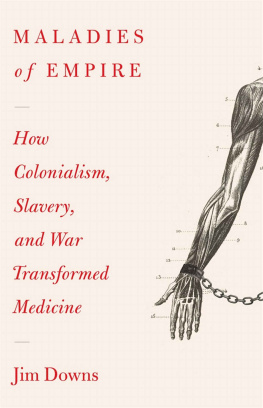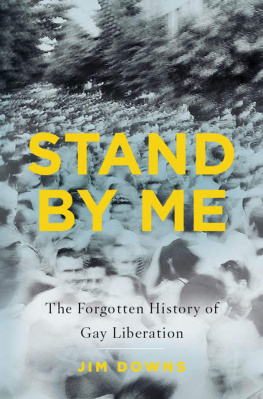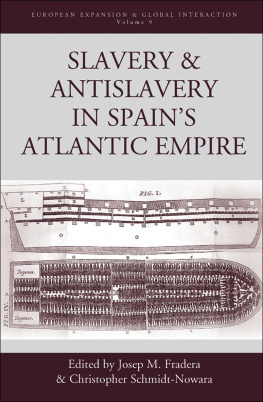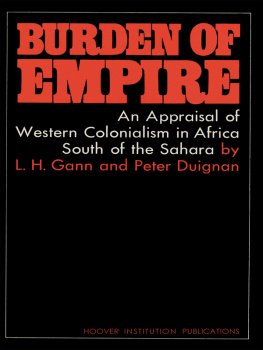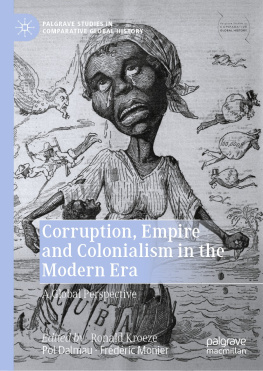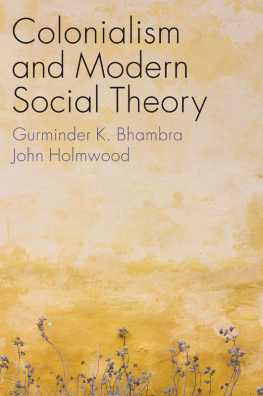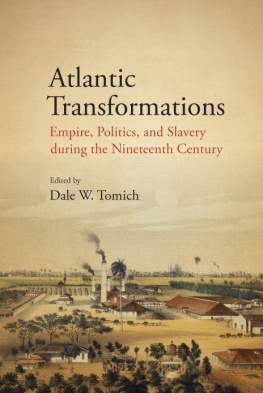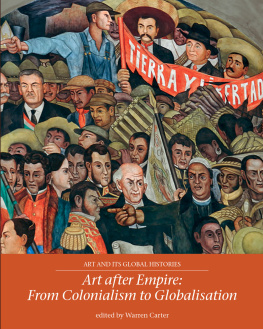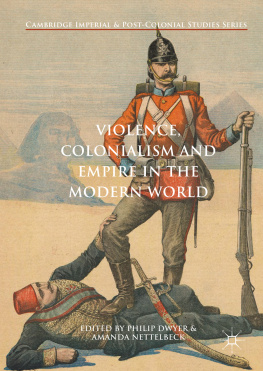Jim Downs - Maladies of empire : how colonialism, slavery, and war transformed medicine
Here you can read online Jim Downs - Maladies of empire : how colonialism, slavery, and war transformed medicine full text of the book (entire story) in english for free. Download pdf and epub, get meaning, cover and reviews about this ebook. year: 2021, genre: Politics. Description of the work, (preface) as well as reviews are available. Best literature library LitArk.com created for fans of good reading and offers a wide selection of genres:
Romance novel
Science fiction
Adventure
Detective
Science
History
Home and family
Prose
Art
Politics
Computer
Non-fiction
Religion
Business
Children
Humor
Choose a favorite category and find really read worthwhile books. Enjoy immersion in the world of imagination, feel the emotions of the characters or learn something new for yourself, make an fascinating discovery.

Maladies of empire : how colonialism, slavery, and war transformed medicine: summary, description and annotation
We offer to read an annotation, description, summary or preface (depends on what the author of the book "Maladies of empire : how colonialism, slavery, and war transformed medicine" wrote himself). If you haven't found the necessary information about the book — write in the comments, we will try to find it.
Jim Downs: author's other books
Who wrote Maladies of empire : how colonialism, slavery, and war transformed medicine? Find out the surname, the name of the author of the book and a list of all author's works by series.
Maladies of empire : how colonialism, slavery, and war transformed medicine — read online for free the complete book (whole text) full work
Below is the text of the book, divided by pages. System saving the place of the last page read, allows you to conveniently read the book "Maladies of empire : how colonialism, slavery, and war transformed medicine" online for free, without having to search again every time where you left off. Put a bookmark, and you can go to the page where you finished reading at any time.
Font size:
Interval:
Bookmark:
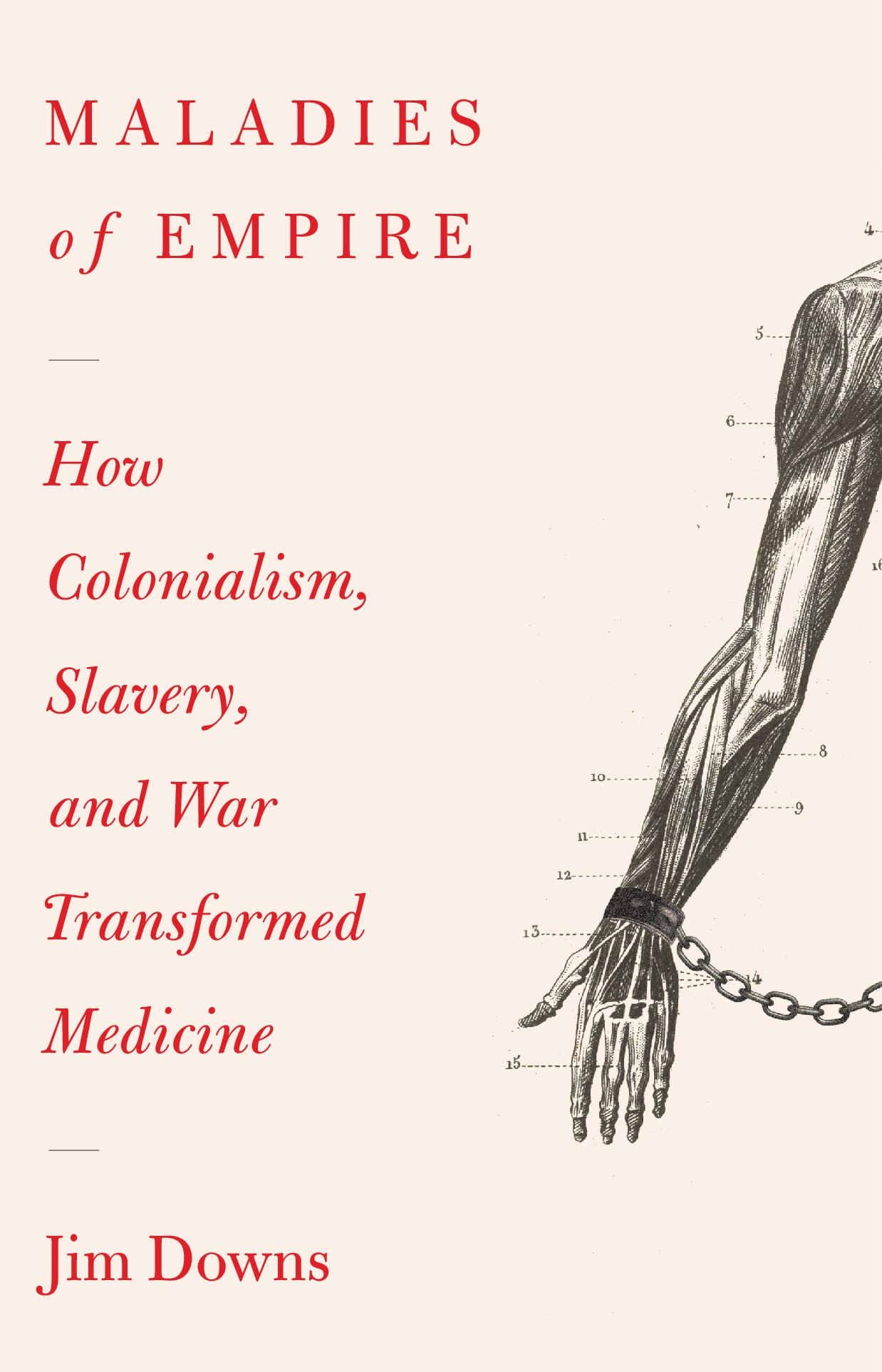
Maladies of Empire
How Colonialism, Slavery, and War Transformed Medicine
Jim Downs
The Belknap Press of Harvard University Press
Cambridge, Massachusetts
London, England
2021
Copyright 2021 by the President and Fellows of Harvard College
All rights reserved
Jacket design by Oliver Munday
978-0-674-24988-2 (EPUB)
978-0-674-24990-5 (PDF)
The Library of Congress has cataloged the printed edition as follows:
Names: Downs, Jim, 1973 author.
Title: Maladies of empire : how colonialism, slavery, and war transformed medicine / Jim Downs.
Description: Cambridge, Massachusetts : The Belknap Press of Harvard University Press, 2021. | Includes bibliographical references and index.
Identifiers: LCCN 2020018202 | ISBN 9780674971721 (cloth)
Subjects: LCSH: EpidemiologyHistory. | SlavesHealth and hygiene. | Imperialism and science. | WarMedical aspects.
Classification: LCC RA649 .D68 2021 | DDC 614.4dc23
LC record available at https://lccn.loc.gov/2020018202
For my mothers maternal grandmother, who, a century ago, cut off her hair and sold it so her children could eat, and who passed along to me the power to persist; and for my mothers paternal grandmother, who was born in the nineteenth century with a veil over her face and healed her sons wife by chanting indecipherable prayers over her body and who passed along to me the power to see
AND
For my fathers people, who despite subjugation by the British Empire, passed along to me the power to know
AND
For Catherine Clinton, whose unwavering mentorship lighted my way
T HE SHIP HAD sailed for over a day from the west coast of Africa. All he could hear was the sound of men speaking foreign languages; the water crashing on the hull; the pitiful cries coming from below decks; the wind powering the sails to the Americas. All he could see was the sky.
He had gotten into an argument with a chief, who, in an act of revenge, had accused him of witchcraft and then sold him and his family from Ghana into slavery, to be taken to the New World. He refused to accept his fate. And so, when the members of the ships crew came along to feed the enslaved Africans with a sticky paste made of beans, rice, oil, and pepper, he did not lift his head to the ladle hovering above him and open his mouth. A crew member noted that he refused all sustenance. Somehow, he managed to get a knife. And then, in an ultimate act of resistance, he slit his own throat, choosing to die rather than be enslaved in the Americas.
Members of the crew noticed his bloody body and notified the surgeon on board, Thomas Trotter, who sewed up the wound and applied a bandage to his neck. That night, the man ripped off the bandage. He yanked at the stitches, trying to wrench them from their hold on his skin. He pulled out all the stitches. Then he dug his fingernails into the other side of his neck, where he tore a ragged hole in the skin. His fingernails turned red, and he bled profusely.
The next morning the crew discovered him, still alive. They dragged him up to the deck. Still able to speak, he declared that he never would go with white men. He then became incoherent and looked wishfully at the skies. The crew restrained his hands again and tried to force food down his throat, but after eight to ten days of refusing to eat, he died. His name is not known. Other details about his life have not survived. We do not know if his family members, who were also aboard the ship, witnessed his act of self-mutilation.
Decades later, in 1839, Robert Dundas Thomson, a physician in London, recounted the story of the anonymous man dying on the slave ship in the Lancet, a leading British medical journal. Thomson had not observed this man himself; he was relating a story that had been told by Trotter during his testimony before Parliament on the slave trade, in the 1790s. Thomson used this account as one among several examples to determine how long a human being can survive without food. It wasnt the brutality that mattered to him, though he did recognize it. It wasnt the violence of the slave trade, though he did detail it. It was that the enslaved African man had survived for over a week without eatingthat was what mattered to Thomson.
In addition to the story of the enslaved man, Thomson reported other case studies to illustrate that insufficient nourishment caused disease and to document how long the human body could survive without food, a condition he called inedia. Thomson included two other accounts from the slave trade: he wrote of an enslaved African man who held his teeth shut when the crew tried to pry open his mouth with a metal instrument to feed him, dying after nine days without food, as well as of a captured African woman who was flogged for refusing to eat and died after about a week. He concluded that inhabitants of Africa can only live without food for ten days when confined in a crowded, unventilated environment. Case studies that he gathered from Europe showed that life could be preserved longer under better circumstances; these examples ranged from a London plasterer to a group of miners and a pregnant French woman to a mentally disabled Scottish man (Thomsons own patient) who lived for seventy-one days on water and small beer alone.
While it is widely known that physicians drew on patient case studies, it has been less often recognized that the slave trade also provided them with examples. Thomson was able to use examples that developed from the international slave trade to form conclusions about how long humans could live without food under different conditions. The slave trade placed large groups of people in crowded conditions that led to medical disorders and provided doctors with valuable information. It created the extreme circumstances in which people refused to eat, contributing to Thomsons ideas about inedia.
Thomsons article was published at a time when medical knowledge was undergoing a major revolution. As Maladies of Empire shows, military hospitals and camps, slave ships, and large-scale population movements created crowded conditions that helped physicians visualize the spread of disease and provided different kinds of information from what they learned from observations of cities, prisons, and hospitals.
Understanding the spread of disease took on special urgency as doctors responded to medical crises that erupted from the international slave trade, colonial expansion, and warfare. In treating the populations that were created by these conditions, military and colonial doctors developed theories about the cause, spread, and prevention of disease. The process of centralizing and analyzing medical information about the health of large populations unfolded during the same period that governments in the West were developing mechanisms to wield authority over populations based on new understandings of biology.
Maladies of Empire reveals how slavery, colonialism, and war, often treated separately in scholarly studies, had common features from the vantage point of medical professionals. These episodes produced large captive populations. Slave ships, plantations, and battlefields created social arrangements and built environments that allowed physicians to observe how disease spread and prompted them to investigate the social conditions that led to the outbreak of disease. The increased appearance of these settings around the world between 1756 and 1866 gave way to a proliferation of medical studies that contributed to the emergence of epidemiology. This book begins in 1756 with the story of British soldiers dying in an overcrowded jail cell in India, which served as a touchstone example throughout the medical profession of the need for fresh air. It concludes with efforts made by various countries around the world to track the spread of the 18651866 cholera pandemic.
Font size:
Interval:
Bookmark:
Similar books «Maladies of empire : how colonialism, slavery, and war transformed medicine»
Look at similar books to Maladies of empire : how colonialism, slavery, and war transformed medicine. We have selected literature similar in name and meaning in the hope of providing readers with more options to find new, interesting, not yet read works.
Discussion, reviews of the book Maladies of empire : how colonialism, slavery, and war transformed medicine and just readers' own opinions. Leave your comments, write what you think about the work, its meaning or the main characters. Specify what exactly you liked and what you didn't like, and why you think so.

